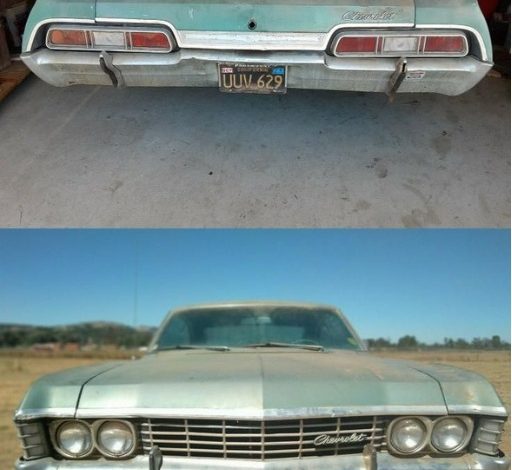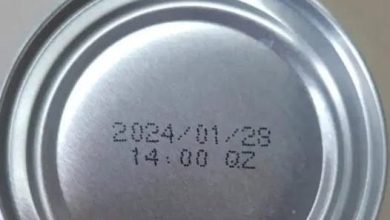MY WIFE SCRAPPED MY 1967 IMPALA—SO I TOOK HER TO COURT

For five long years, I lived and breathed the restoration of my 1967 Impala. It wasn’t just a car; it was a piece of my soul. Imagine, if you will, a classic beauty, a symbol of a bygone era, slowly brought back to life. I spent countless hours and a lot of money, working piece by piece, turning a rusted shell into something magnificent. This car was my passion, my project, my way to escape the everyday.
My wife, Nadia, saw it differently. She thought it was a waste, a “rusted hunk of junk” cluttering our garage. We had our disagreements, sure, but I always thought she understood how much it meant to me. Or, at least, I hoped she did.
Then, one day, I walked into an empty garage. The Impala was gone.
My first thought was that she had moved it. But then she told me the truth: she had it towed to the scrapyard. Crushed. Destroyed. Gone.
I was stunned. I drove to the yard, but it was too late. Five years of work, thousands of dollars—all reduced to scrap metal.
I was angry, and deeply hurt. When I told her she had no right to do that, she simply said, “You weren’t doing anything with it anyway.” As if it were just an old appliance, not something I had poured my heart into.
So, I did something I never thought I would do: I filed a lawsuit.
Now, Nadia acts like I’m the villain. Her family calls me, saying I’m being “petty for suing my own wife.” But I’m not seeking revenge. I just want to be paid back for what she destroyed.
Am I in the wrong? Or did she cross a line that had to have consequences?
Let me tell you, when I first brought that ’67 Impala home, I felt like a kid again. It was rough, I admit. The engine was broken, the inside was worn out, and the body had rust holes. But the moment I saw its classic shape and the shiny (though damaged) chrome, I knew I had to bring it back to life.
Nadia didn’t share my excitement. She thought every extra dollar should go to the house or future savings. I understood that. We had bills to pay. But I worked extra hours, took on side jobs, and saved specifically for the Impala. I never took money away from our needs. I told Nadia, “You have your hobbies, I have mine.” She liked gardening, cooking, and fancy paper; I liked classic cars.
Over the years, I learned how to fix and restore cars. I learned how to sand metal, paint, and detail every part. My friend helped me fix the engine. It just needed a new block, a new carburetor, and some care.
Just when I was close to finishing, Nadia decided to take action. One day, while I was at work, she had it towed away. I’ll never forget coming home to an empty garage. She said she did me a favor by getting rid of the “eyesore.” My heart sank.
I asked, “You couldn’t at least talk to me about it first?” She shrugged, and I saw a smirk. That’s when I knew she thought I was wrong, that I was being childish.
It was time for the court to decide.
When I filed the lawsuit, Nadia’s mother called, angry. “How dare you take my daughter to court? Are you trying to ruin your marriage?” I got texts from her family and friends, all saying I was breaking my marriage vows. They didn’t understand it wasn’t just about money. It was about respect and losing something I loved.
I thought about it. Could we try something else? Counseling? Talking it out? But after a big fight, where Nadia said my car was a “childish obsession,” I knew I had to go through with the lawsuit. It wasn’t about revenge; it was about responsibility.
Then, I found out my insurance wouldn’t help. My policy didn’t cover damage done by someone in my house. So, court was my only option.
In court, Nadia looked confident. Her lawyer said because the car was in both our names, she had the right to get rid of it. My lawyer said destroying property without permission was wrong and possibly illegal.
The judge listened carefully. Nadia said I was obsessed. I said I always paid the bills and put us first.
Then, my friend Dwight gave the court receipts. He showed how much I spent on parts and said Nadia knew about it. This proved she knew how much I had invested.
As the court case went on, I felt sad. I missed my car, and I missed the happy days of our marriage. Every conversation was about lawyers and court. I felt sad for Nadia, too. Was our marriage so weak that a lawsuit would break it? Or was it already broken when she had the car scrapped?
The judge ruled in my favor. Nadia had destroyed a shared item without my permission. The settlement would cover the money I spent and the legal fees. I felt relieved, sad, and justified.
Nadia looked shocked. We drove home separately. It felt like the end. I told her we needed counseling. She agreed, but she sounded cold.
We tried counseling. We found problems beyond the car: her anger at my “escapes,” my frustration at her lack of support, and our bad communication. It was hard.
But we started to understand each other. She admitted she didn’t know how serious I was about the car. I admitted I spent too much time in the garage. We started to see each other again.
We agreed on a payment plan. It didn’t bring back the car, but it was something.
I learned that talking and respect are important. It’s about caring enough to talk things through.
If you value something, be honest about it. Respect goes both ways. Nadia and I are still working on our marriage.
I won my lawsuit, but I didn’t get my car back. It made us face our problems. Don’t wait until it’s too late. Talk about your dreams.
If you liked this story, share it. Sometimes, hearing someone else’s story helps us with our own.




